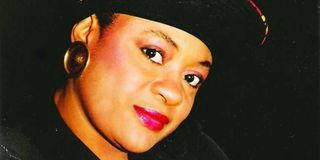Prime
Congolese singer and dancer Tshala Muana buried

Elisabeth Muidikay, alias Tshala Muana, who died yesterday in Kinshasa, DRC. PHOTO |AFP
Top Congolese musician Tshala Muana was buried in Kinshasa on Friday, four days after the internment of her counterpart, Kiamuangana Mateta Verckys.
Tshala, who was also popularly known as Mamu Nationale (Mother of the Nation) and the ‘Queen of Mutuashi’, died on December 10 after a long illness.
Just like Kiamuangana’s, her body was lying at the Hospital du Cinquantenaire in the Democratic Republic of Congo capital.
Verckys, who was a seasoned saxophonist, composer, band leader and musicians’ rights campaigner, died in October.
According to a tentative funeral programme released in Kinshasa on Tuesday, a two-day funeral vigil for Tshala ended on Thursday at the Maisha Park.
On Friday morning, fellow musicians, fans, and state officials converged at the Palais de Peuple (People's Palace) for a funeral service.
Necropolis Cemetery
She was laid to rest at the Necropolis Cemetery on Kinshasa’s outskirts.
The service at the People's Assembly was to pay a special tribute to her, as a former nominated Member of Parliament.
According to reports from Kinshasa, the government and the family agreed to have the funeral held before the Christmas weekend.
Her partner and music producer Claude Mashala has been hosting mourners at their residence since she died. They include former DR Congo First Lady Olive Lembe Kabila.
Tshala, who started her entertainment career as a dancer, and went on to become one of the leading Congolese female singers, will be remembered for having popularised her Tshiluba language from the country’s southern Kasai region.
Unlike other leading Congolese musicians, who mainly sing in Lingala, one of the official languages, Tshala recorded most of her songs in Tshiluba.
She excelled at promoting the sexy traditional mutuashi cultural dance expressing feminism.
Her hit songs from when she left DR Congo to hone her talent in West Africa, performing in Abidjan, Cote d’Ivoire, and other cities, include, Karibu Yangu, Tshibola, Kalume, and the ever-green ballad, Vuluka Dilolo.





